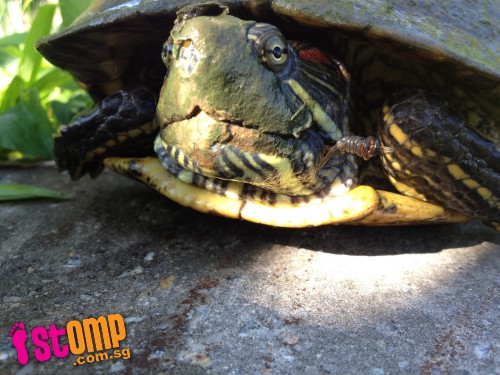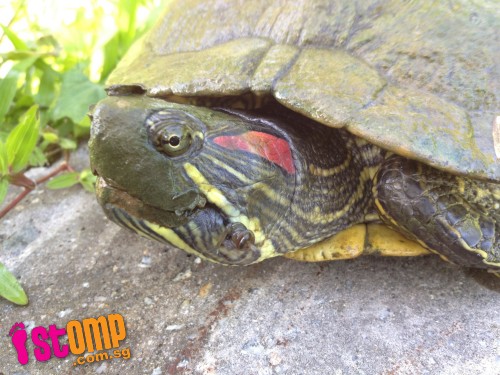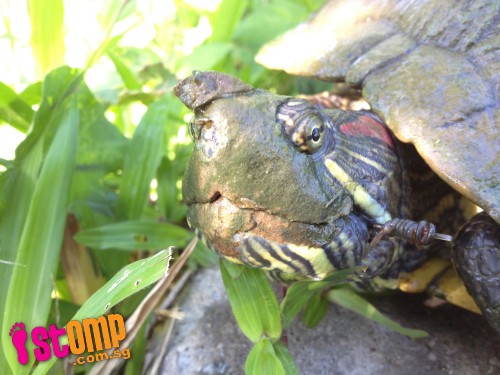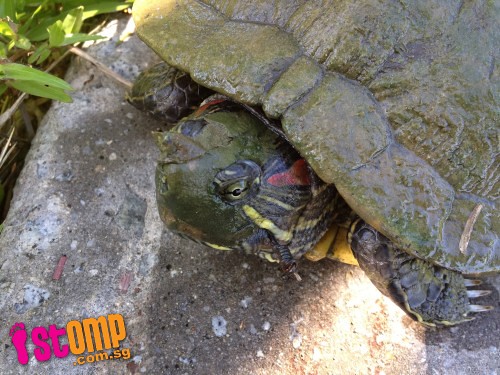
STOMPer Varanus salvator was enraged that a fishing hook left behind by irresponsible anglers had wounded this turtle near Lorong Halu Wetlands yesterday. (April 1)
The STOMPer wrote:
"Anglers need to be more responsible and make sure that their fishing hooks and lines are properly disposed of.
"There have been many cases of wildlife in Singapore such as birds, monitor lizards, snakes, and even wild boar being injured or even killed after swallowing discarded fishing hooks or getting entangled in fishing lines.
"I found this red-eared slider in a drain near Lorong Halu Wetlands on the morning of April 1, 2012. It had a hook embedded in its mouth and could not swim away because the fishing line attached to the hook was snagged on the vegetation.
"I managed to cut the fishing line off, but the hook was too deeply lodged and could not be removed.
"In the photos, you can see one end of the rusty hook protruding from the corner of the turtle's mouth. Besides this injury, the turtle seemed quite healthy.
"Kudos to the ACRES Wildlife Rescue team for their quick response in picking up the turtle and sending it to the vet to get the hook removed. Hope that the hook was removed without complications and that the turtle makes a speedy recovery!"





There is a rumour that anyone who submits an article to STOMP gets $50; I suppose that it's a complete fabrication, or at least an exaggeration. Maybe the monetary reward only applies if a person posts something notable enough to be picked up by the newspapers.
In any case, I'm glad that my tale of rescuing a red-eared slider (Trachemys scripta elegans) managed to reach a greater audience, and hopefully make more people aware of the potential threat of discarded fishing gear.
When writing these posts based on STOMP articles, I don't usually bother with the comments on the article; I've found that it's usually less painful to just make a couple of comments and attempt to educate readers with basic facts, or rebut some of the more stupid or ridiculous comments. But I thought I should respond to some of the comments that others have made on this article, especially since this was my submission.
PeterPen:
"possibilities the anglers is fishing but the turtle eat the bait. (i dont think the anglers want to do that)kokishundo:
also according to my understanding the hook will dissolve but might take a longer time.
so let hope the poor turtle will survive till the hook rust and break."
Actually, it's not always the angler's fault.JohnEdward:
Assuming the angler was fishing legally, and that he/she had no other intent other than catching fish.
If you have actually gone fishing before, you would know that the hook sometimes tend to catch onto something, like maybe a piece of heavy rock. The angler will keep tugging to release the hook, but more likely the line breaks.
Yes, the line sometimes does break only at the hook area, so you would sometimes find yourself reeling in only the sinker.
No, I am not backing the angler up. I'm just providing a my point of view as a fisherman/angler.
Hooks are made to rust away to prevent such incidents. It might be also because of the reptile itself took the bait of the anglers. Whichever it is, it shouldn't kill.pyjstein:
Hooks are designed to rust away safely. Removing it forcefully cause more pain!
If the angler is aware that he had unintentionally hooked a creature (Red-eared Slider, or otherwise), the ethical thing to do is to safely remove the hook (if possible), or else contact a vet/ animal rescue facility. Likewise for passers-by who might have spotted similarly-injured animals.While it is true that if left alone, the hook would most likely have eventually rusted away and broken off, I strongly feel that if an animal is found with a hook lodged in its mouth, rather than leaving it to deal with the pain and possible infection from a rusting hook, the best thing one could do would be to rescue the animal and have a veterinarian remove the hook.
The same principle also applies to the removal of traps (eg. nets, cages) that are set up where they should not be, & hence become a risk to passing animals.
Whether one is the culprit or just a passerby, the worst possible thing is to stand by -- & do nothing.
As I said in my original post, when I first found the turtle, it had been effectively immobilised, due to the fishing line being snagged on vegetation. While turtles can be quite hardy and survive for some time without food, I didn't want to count on the turtle being able to live off its reserves or depend on fishes or insects swimming into its mouth while it waited for the hook to rust away. Not to mention the fact that with heavy rain, the water level in the drain could have risen dramatically and drowned the turtle.
I'm not sure what sort of warped mind believes that it's more humane to allow a hook to slowly rust away, leaving behind a wound that's vulnerable to infection, rather than have it removed quickly through surgery.
As an aside, if you thought the majority of people who submit articles to STOMP and make comments there are bad, this thread clearly indicates that people who frequent HardwareZone Forums probably aren't any better.